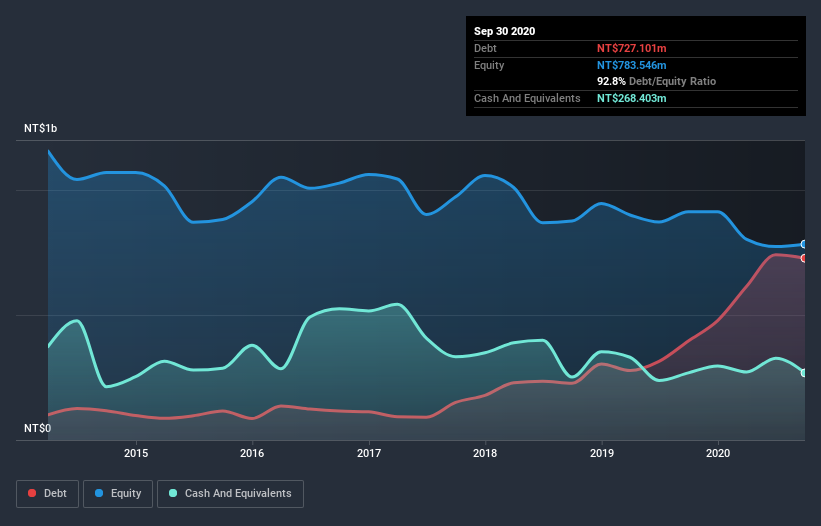David Iben put it well when he said, 'Volatility is not a risk we care about. What we care about is avoiding the permanent loss of capital.' When we think about how risky a company is, we always like to look at its use of debt, since debt overload can lead to ruin. As with many other companies Redwood Group Ltd (GTSM:8426) makes use of debt. But the more important question is: how much risk is that debt creating?
Why Does Debt Bring Risk?
Debt assists a business until the business has trouble paying it off, either with new capital or with free cash flow. If things get really bad, the lenders can take control of the business. While that is not too common, we often do see indebted companies permanently diluting shareholders because lenders force them to raise capital at a distressed price. Of course, plenty of companies use debt to fund growth, without any negative consequences. When we examine debt levels, we first consider both cash and debt levels, together.
See our latest analysis for Redwood Group
What Is Redwood Group's Net Debt?
You can click the graphic below for the historical numbers, but it shows that as of September 2020 Redwood Group had NT$727.1m of debt, an increase on NT$396.0m, over one year. On the flip side, it has NT$268.4m in cash leading to net debt of about NT$458.7m.

How Healthy Is Redwood Group's Balance Sheet?
According to the last reported balance sheet, Redwood Group had liabilities of NT$498.8m due within 12 months, and liabilities of NT$566.7m due beyond 12 months. Offsetting this, it had NT$268.4m in cash and NT$382.8m in receivables that were due within 12 months. So its liabilities outweigh the sum of its cash and (near-term) receivables by NT$414.3m.
This deficit is considerable relative to its market capitalization of NT$688.3m, so it does suggest shareholders should keep an eye on Redwood Group's use of debt. This suggests shareholders would be heavily diluted if the company needed to shore up its balance sheet in a hurry. When analysing debt levels, the balance sheet is the obvious place to start. But you can't view debt in total isolation; since Redwood Group will need earnings to service that debt. So if you're keen to discover more about its earnings, it might be worth checking out this graph of its long term earnings trend.
In the last year Redwood Group had a loss before interest and tax, and actually shrunk its revenue by 34%, to NT$1.1b. That makes us nervous, to say the least.
Caveat Emptor
Not only did Redwood Group's revenue slip over the last twelve months, but it also produced negative earnings before interest and tax (EBIT). Indeed, it lost a very considerable NT$97m at the EBIT level. Considering that alongside the liabilities mentioned above does not give us much confidence that company should be using so much debt. Quite frankly we think the balance sheet is far from match-fit, although it could be improved with time. However, it doesn't help that it burned through NT$334m of cash over the last year. So in short it's a really risky stock. The balance sheet is clearly the area to focus on when you are analysing debt. But ultimately, every company can contain risks that exist outside of the balance sheet. For example, we've discovered 3 warning signs for Redwood Group (2 are potentially serious!) that you should be aware of before investing here.
Of course, if you're the type of investor who prefers buying stocks without the burden of debt, then don't hesitate to discover our exclusive list of net cash growth stocks, today.
If you decide to trade Redwood Group, use the lowest-cost* platform that is rated #1 Overall by Barron’s, Interactive Brokers. Trade stocks, options, futures, forex, bonds and funds on 135 markets, all from a single integrated account. Promoted
New: AI Stock Screener & Alerts
Our new AI Stock Screener scans the market every day to uncover opportunities.
• Dividend Powerhouses (3%+ Yield)
• Undervalued Small Caps with Insider Buying
• High growth Tech and AI Companies
Or build your own from over 50 metrics.
This article by Simply Wall St is general in nature. It does not constitute a recommendation to buy or sell any stock, and does not take account of your objectives, or your financial situation. We aim to bring you long-term focused analysis driven by fundamental data. Note that our analysis may not factor in the latest price-sensitive company announcements or qualitative material. Simply Wall St has no position in any stocks mentioned.
*Interactive Brokers Rated Lowest Cost Broker by StockBrokers.com Annual Online Review 2020
Have feedback on this article? Concerned about the content? Get in touch with us directly. Alternatively, email editorial-team (at) simplywallst.com.
About TPEX:8426
Redwood Group
Engages in the decoration of boutique brand stores in Asia, the Middle East, the United States, and Europe.
Flawless balance sheet second-rate dividend payer.
Market Insights
Community Narratives




